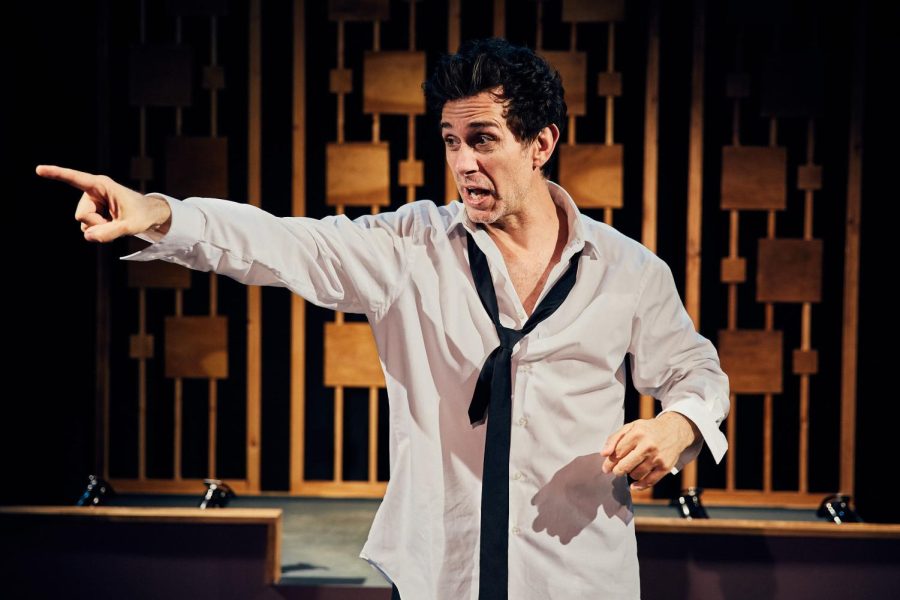Comedy and censorship featured in ‘I’m Not a Comedian… I’m Lenny Bruce’
Ronnie Marmo acts in “I’m Not a Comedian… I’m Lenny Bruce.”
October 23, 2022
Comedy is rarely timeless. In Lenny Bruce’s case, his relevance stems from a reminder of our First Amendment rights, especially at times where people in power threaten those rights. “I’m Not a Comedian… I’m Lenny Bruce,” a one-man, one-act show written by and starring Ronnie Marmo, had a limited run Friday and Saturday at the Byham Theater.
Directed by Joe Mantegna, the play follows the life and death of comedian Lenny Bruce, a pioneer of comedy. Bruce is known for his controversial acts where he often discussed societal taboos such as religion, racism, sexual identity, censorship and more.
The set for this production was simple — two chairs, one toilet and Bruce with a microphone stand.
Ronnie Marmo said he first starred as Bruce in the play “Lenny Bruce is Back (And Boy is He Pissed)” in 2010, written by Sam Bobrick and Julie Stein. After this run, he realized he wanted to create his own production, going deeper into Bruce’s life and comedy.
“I realized that I was doing a safer version of Lenny than I wanted to. In the material, we weren’t doing his routines, we were just talking about them. I set out to write my own and it took five years to write it,” Marmo said. “Through that process I fell in love with telling Lenny’s story and thought it was important to write my own version and tell the entire story.”
That play became “I’m Not a Comedian…I’m Lenny Bruce,” which first premiered in Los Angeles in 2017, followed by an off-Broadway run in 2018. The play shifts between comedy routines of Bruce and musings about his life. Police arrested the comedian numerous times on obscenity charges throughout the 50s and 60s before his death in 1966.
One arrest for obscenity led to a case that went to the Supreme Court of Illinois, where Bruce won on the grounds that his speech had social value, and thus were under protection. Even after this monumental case, Bruce continued to be arrested, Marmo said.
“He got sentenced to four months on Rikers Island for words,” Marmo added.
The idea of punishment “for words,” is an overarching theme throughout the play. During his career, police arrested Bruce for saying words such as “cocksucker,” “fuck,” or “to come” during various stand-up sets. Sometimes, they would arrest him when he didn’t use profrainity, and instead for giving his commentary on religion or race.
Marmo said he believes Bruce’s controversies and outspoken voice are what made him a pioneer in comedy.
“He was the voice that spoke truth to power. He held a mirror up to society. Every certain amount of time, there’s that one person that stands up for what they believe in and then paves the way for many many others,” Marmo said. “Not only did he affect comedy but also the law. He was a satirist. He was effective in poetry, music, everything you can think of… Lenny was a humongous influence.”
According to Marmo, it is vital that young people learn about both this play and Bruce’s legacy. Originally, he wished for this play to travel the college circuit, but he said he feels thankful that local college students in Pittsburgh and beyond will get the chance to see the production.
“The First Amendment is always a hot topic, but never more than now… One of the things I was so attracted to was bringing Lenny Bruce and his voice to younger people because many people in this generation don’t know who he was or they might just know him from ‘The Marvelous Mrs. Maisel,’” Marmo said.
A fictional version of Bruce is portrayed in “The Marvelous Mrs. Maisel,” played by Luke Kirby. The show led to wider audiences being aware of both Bruce and his comedy.
Although the Amazon Prime show and the play are set in the ‘50s and ‘60s, theater critics have praised the relevant nature of the show even today. Zachary Stewart of TheatreMania said in a review of the play that Marmo offered a raw portrayal of Bruce’s life.
“Marmo heartbreakingly shows us the price Lenny Bruce paid so that the rest of us could enjoy the relatively unfettered interpretation of the First Amendment that prevails today,” Stewart said. “He also makes us wonder who is willing to pay that price again.”
Bruce’s personal life was often grim, with no help from his never-ending legal battles. Bruce suffered from addiction and died of a drug overdose in 1966. Today, Bruce’s only child, Kitty Bruce, founded the Lenny Bruce Memorial Foundation in 2008. A portion of the plays proceeds go to the foundation, which aims to combat drug and alcohol addiction.
Being a one-man show, Marmo said he relies on the energy of both the audience and himself during performances. The moments during the show when Bruce is not doing stand-up are particularly sobering.
“It’s such a humbling show. Essentially I’m doing a 90-minute monologue to the audience… I start the play dead naked on the toilet and for 90 minutes it doesn’t let up,” Marmo said. “If you ask me after the show what my favorite routine is, it’ll be different every night.”
After performing this role more than 400 times over the span of five years, Marmo said he still feels that Bruce and this production are vital, even though his relation to Bruce has evolved.
“I’ve taken a stand for him so often at a group level that I feel like I’m fighting for him… Overall I feel like he and I are coming together in this fight and I think that’s why people keep coming. He’s a voice that people want to hear right now,” Marmo said. “It’s important to me to open a conversation… Lenny used to say there are no dirty words, just dirty minds. We give words power.”








